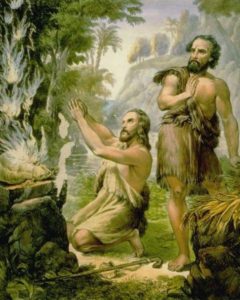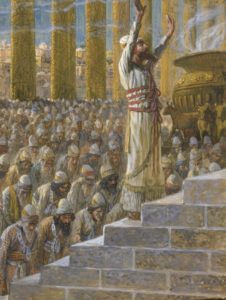Unique for Unique – Natural Requirements for Divine Worship
by Fr. William Rock, FSSP
It is incumbent upon each of us to know the relationships we are in and to act appropriately with respect to each.1 It is, for example, important and imperative for a husband and father to know whom his wife and children are and to act towards them in a fitting manner. The most important relationship each one of us has, however, is our relationship with God. This is because each of us has a relationship with God which we do not and cannot have with anyone else – we each depend upon God for our continued existence. For not only did God create each of us, He also maintains each of us in existence, in being, from moment to moment. If He were to cease to maintain this support, we would not die, we would cease to exist altogether, returning to the nothingness from which we were drawn.2

It is incumbent, then, that each recognize that we have this dependence on God. But mere intellectual recognition is not enough. As man is a composite of soul and body, the acknowledgement of this relationship, this dependence, by the intellect should be manifested externally.3 And, since our relationship to God is wholly unique, this external manifestation or expression should be wholly unique. Unique for unique. Now the unique expression of the recognition of this unique relationship is, historically and universally, sacrifice.4 “Described in simple terms, sacrifice is the offering of a gift to God. Man, the creature, instinctively realizes that when he comes formally into the presence of his Creator, he must bear with him a gift as the supreme token of his respect. This gift is some material thing of value: it is a symbol of God’s supreme dominion over all things, especially over man, for whom it is substituted. To signify its return to God’s exclusive possession, the gift is destroyed or altered in some way.”5 To put it another way, a sacrifice “is the offering to God of some sanctified object, made by a legitimate priest, who destroys or otherwise changes that object in acknowledgement of God’s supreme dominion over man.”6
It is natural for man, as he is a social creature by nature,7 to join with other men when undertaking things of great importance,8 including that of offering sacrifice to their common Creator Who has dominion over each and all. But, in order to safeguard the expression of the unique relationship between each man and God, the unique action of sacrifice, when performed in common, must be surrounded by the other unique things – rites, “languages, vestments, vessels, places, and even persons.”9 Unique for unique.

It is important to note here, as a consequence, that religious services which more poorly express this required uniqueness, either with regards to sacrifice or the surrounding ceremonies, are naturally inferior to those which express this required uniqueness well. Conversely, those which express this required uniqueness well are naturally superior to those which express it more poorly. Additionally, since this required uniqueness springs from man’s relationship with God and from the requirements of man’s nature, religious ceremonies in which this required uniqueness is completely absent are contrary to human nature.
This required uniqueness in the worship of the Creator, which springs from human nature and each one’s relationship with the Divine, serves as an objective standard by which to evaluate religious services and, in particular, those in which sacrifice is offered. As such, these requirements are eminently applicable to the Sacrifice of the New Law (The Holy Mass/Divine Liturgy/Holy Qurbana) and thus raise the discussion about different forms and celebrations of this Sacrifice above subjective tastes and preferences. After all, Christianity, though it deals with the supernatural, does not deny human nature, but rather presumes human nature and perfects it,10 divine worship not excepted.
Fr. William Rock, FSSP was ordained in the fall of 2019 and is currently assigned to Regina Caeli Parish in Houston, TX.
1 This article draws heavily from a course (The Natural Superior of Traditional Worship) given in 2018 by the International Society of Scholastics.
2 See S.T. I, q. 104, a.2.
3 See S.T. II-II, q. 84, a.2.
4 See S.T. II-II, q. 85.
5 Higgins, Thomas J. Man as Man – The Science and Art of Ethics. Milwaukee: Bruce, 1949, n. 342.
6 Ripley, Francis. This is the Faith. Rockford: Tan, 2002, p. 268.
7 See Aristotle. Politics, 1253a
8 See St. Thomas. De regno, I.1.
9 The Natural Superior of Traditional Worship, slides 17, 32.
10 See S.T. I, q. 1, a. 8, ad 2.
August 16, 2021








